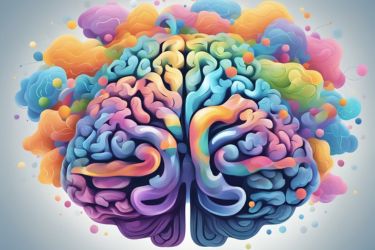Emotional intelligence (EI) is a crucial skill that greatly influences how we manage stress in our daily lives. By being aware of our emotions and understanding the feelings of others, we can navigate stress more effectively. Cultivating emotional intelligence helps us improve our stress management techniques, leading to enhanced well-being and stronger relationships.

When we face stress, our emotional responses can either help us cope or make the situation worse. Those with high emotional intelligence are often better equipped to handle challenges and pressure. They can recognise their emotions, respond thoughtfully, and take proactive steps to reduce stress, thereby promoting a healthier work and personal environment.
As we explore the role of emotional intelligence in stress management, we will uncover practical strategies to enhance our EI skills. By doing so, we can learn to approach stress more constructively and foster a greater sense of well-being in our lives.
Understanding Emotional Intelligence

Emotional intelligence, or EI, plays a crucial role in how we manage our emotions and handle stress. By developing our EI, we can improve our mental health and enhance our ability to cope with life’s challenges. This section explores the importance of EI, its key components, and its impact on mental well-being.
Concept and Importance of EI
Emotional intelligence is the ability to recognise and understand our own emotions and the emotions of others. This skill is vital for effective communication and relationship building.
Why is EI important?
- Improved Relationships: High EI helps us connect better with others.
- Better Decision-Making: Understanding emotions leads to more thoughtful choices.
- Stress Management: EI enables us to handle stress more effectively, reducing anxiety.
By focusing on EI, we create a strong foundation for personal and professional growth, leading to healthier interactions and enhanced resilience.
Components of EI: Self-Awareness and Self-Regulation
Two key components of emotional intelligence are self-awareness and self-regulation.
Self-Awareness: This is our ability to recognise our emotions and how they affect our thoughts and behaviour. We can identify triggers and understand how we respond to various situations. Developing self-awareness can help us manage our reactions and improve our interactions.
Self-Regulation: This involves controlling our emotions and impulses. It allows us to respond thoughtfully rather than reacting impulsively. Good self-regulation leads to emotional stability. We can remain calm under pressure and make better decisions during challenging situations.
Together, self-awareness and self-regulation form a strong basis for emotional intelligence, helping us navigate stress more effectively.
EI and Mental Health
Emotional intelligence has a significant connection to mental health. Individuals with high EI are better equipped to cope with stress and emotional challenges.
Benefits of EI for Mental Health:
- Reduced Anxiety: By understanding our emotions, we can manage anxiety more effectively.
- Enhanced Resilience: High EI helps us bounce back from setbacks.
- Healthier Relationships: Improved interpersonal skills foster support systems that are essential for mental well-being.
In conclusion, cultivating emotional intelligence can lead to better mental health and a more balanced life. By focusing on our emotional skills, we can create a foundation for managing stress and enhancing our quality of life.
Emotional Intelligence in Relationships

Emotional intelligence is crucial for building and maintaining healthy relationships. By enhancing our empathy and communication skills, we can resolve conflicts more effectively and strengthen our connections with others.
Empathy and Social Skills
Empathy allows us to understand and share the feelings of others. This ability is essential in nurturing strong relationships. When we recognise the emotions of those around us, we create a sense of trust and support.
Social skills play a vital role in how we interact with others. They include our ability to connect, engage, and respond appropriately to different social situations. By improving these skills, we can navigate relationships more smoothly.
Examples of social skills include:
- Active listening
- Teamwork
- Building rapport
Stronger empathy and social skills lead to deeper, more meaningful connections. They also help us to respond sensitively to others’ needs.
Communication and Conflict Resolution
Effective communication is at the heart of every successful relationship. It involves expressing our thoughts clearly while also listening to others. When we communicate well, we reduce misunderstandings and build stronger bonds.
Conflict is a natural part of relationships. Our emotional intelligence helps us handle disagreements in a constructive manner. We can approach conflicts with an open mind, seeking to understand different perspectives.
Key components for conflict resolution include:
- Remaining calm
- Acknowledging feelings
- Finding common ground
By practising these techniques, we can resolve conflicts peacefully and strengthen our relationships.
Stress and Its Impact on Wellbeing

Stress affects our lives in many ways, influencing both mental and physical health. Understanding its sources and effects helps us manage stress better, leading to improved wellbeing.
Understanding Stress and Anxiety
Stress is a natural response to demanding situations. It can lead to feelings of anxiety, which may become overwhelming if not managed properly. When we face stress, our bodies release hormones like cortisol. While this response can aid in tackling immediate challenges, prolonged exposure can harm our mental health.
Symptoms of chronic stress include:
- Fatigue
- Irritability
- Difficulty concentrating
Actively recognising these symptoms allows us to take steps to reduce stress and its impact on our wellbeing.
Stress in the Workplace and Productivity
Workplace stress is prevalent and can significantly impact productivity. Factors such as tight deadlines, heavy workloads, and conflicts with colleagues contribute to this stress. According to studies, high levels of workplace stress often lead to decreased efficiency.
Effects of workplace stress include:
- Increased absenteeism
- Lower job satisfaction
- Higher turnover rates
We must address these stressors to create a healthier work environment. This can involve promoting open communication, encouraging breaks, and offering mental health resources, fostering higher productivity and wellbeing for everyone involved.
The Psychological Impact of COVID-19
The COVID-19 pandemic has heightened levels of stress and anxiety across the globe. Social isolation, fear of illness, and economic uncertainty have added pressure to our daily lives. Research indicates that many have reported increased feelings of sadness and anxiety during this time.
Support systems and coping strategies became crucial. Activities such as:
- Staying connected with loved ones
- Engaging in physical exercise
- Practising mindfulness or relaxation techniques
These methods can lessen the psychological impact of such stressful periods and help in maintaining our overall wellbeing. Addressing these challenges is essential for our recovery and long-term mental health.
Strategies for Managing Emotions and Stress

Effective management of emotions and stress is key to maintaining our mental well-being. We can adopt various techniques to control our feelings and build resilience. These strategies involve coping mechanisms, the practice of meditation and self-care, and the development of emotional regulation.
Coping Mechanisms and Coping Strategies
Coping mechanisms help us deal with stress and emotions in productive ways. We can use both problem-focused and emotion-focused strategies.
-
Problem-Focused Coping: This involves tackling the source of stress directly. We can identify the stressor and take steps to resolve it. For example, if work pressure is overwhelming, we could prioritise tasks and seek help if needed.
-
Emotion-Focused Coping: This focuses on managing our emotional response. Activities like talking to friends, engaging in hobbies, or practicing breathing exercises can be effective.
Understanding our triggers helps us choose the right strategy. Journaling can also enhance our coping skills by allowing us to reflect on our emotions.
The Role of Meditation and Self-Care
Meditation is a powerful tool for reducing stress and enhancing emotional awareness. By practising mindfulness meditation, we can improve our self-awareness and recognise stress triggers more effectively.
Some techniques we can use include:
- Deep Breathing: This can calm our mind and reduce anxiety.
- Guided Imagery: Visualising peaceful scenes helps us shift focus from stress.
Self-care is equally important. Regular exercise, a balanced diet, and adequate sleep support our emotional health. Taking time for activities we enjoy is essential for relaxation.
Developing Resilience and Emotional Regulation
Building resilience allows us to bounce back from challenges. We can develop this skill through positive self-talk, setting realistic goals, and practising gratitude. Recognising our emotions and understanding them is crucial.
Emotional regulation techniques include:
- Identifying Emotions: Naming our feelings can reduce their intensity.
- Regulating Responses: We can learn to respond calmly instead of reacting impulsively.
Engaging in challenging situations intentionally can also build our resilience. We learn more about ourselves and how to manage stress better through these experiences.
Applying Emotional Intelligence in Personal Development
Emotional intelligence plays a vital role in our personal development, influencing our ability to manage ourselves and relate to others. By honing this skill, we can enhance our motivation, leadership abilities, job satisfaction, and academic performance effectively.
Self-Management and Motivation
Self-management is a key factor in emotional intelligence. It allows us to control our emotions and reactions. When we develop self-management skills, we become more adept at handling stress and setbacks.
This can lead to increased motivation. By setting clear goals and recognising our feelings, we are more likely to stay focused and persist in our efforts.
Key strategies for self-management include:
- Setting specific, achievable goals
- Recognising emotional triggers
- Practising mindfulness techniques
By applying these strategies, we can improve our self-efficacy, leading to greater personal success.
Leadership and Job Satisfaction
Emotional intelligence greatly impacts our leadership skills. Leaders who possess high emotional intelligence can connect with their teams more effectively. This connection builds trust and fosters an environment where team members feel valued.
As we enhance our emotional skills, we can improve our ability to give constructive feedback and manage conflict. This contributes to higher job satisfaction within our teams.
Effective leadership practices include:
- Actively listening to team members
- Acknowledging achievements
- Being open to feedback
Incorporating these practices helps create a positive workplace culture that supports both individual and team growth.
Academic Achievement and Performance
In academic settings, emotional intelligence can boost our performance. Students who develop these skills tend to manage stress better and maintain focus. The ability to understand and regulate emotions directly correlates with academic success.
We can also enhance our self-efficacy by setting realistic academic goals and seeking support when needed.
Essential techniques for academic success are:
- Organising study schedules
- Seeking feedback from teachers
- Building supportive relationships with peers
By applying emotional intelligence in our academic pursuits, we improve our overall performance and achievement.
Measuring Emotional Intelligence and Its Consequences
We can assess emotional intelligence (EI) through various methods that provide insights into its impact on personal and professional outcomes. Understanding these measurement tools helps us appreciate the effects of EI on decision-making, adaptability, and job performance.
Emotional Intelligence Scale and Self-Report Measures
The Emotional Intelligence Scale is a popular tool for measuring EI. It can provide valuable insights into our emotional awareness and regulation. Self-report measures, such as questionnaires, allow individuals to assess their emotional skills based on their perceptions.
Some common self-report tools include:
- Emotional Quotient Inventory (EQ-i)
- Trait Emotional Intelligence Questionnaire (TEIQue)
These measures evaluate aspects like emotional perception, expression, and empathy. We often use the results to identify strengths and areas needing improvement.
Emotional Quotient (EQ) and Decision-Making
Emotional Quotient (EQ) relates to our ability to handle emotions effectively. A high EQ enhances our decision-making skills by allowing us to manage stress and think clearly. We are less likely to make impulsive decisions when we understand our feelings.
Research shows that individuals with higher EQ are better at evaluating emotional information. They can weigh the emotional impact of their choices, leading to more thoughtful and balanced decisions.
Significant Relations: EI, Adaptability, and Job Performance
The relationship between emotional intelligence and adaptability is crucial. High EI helps us adjust to changes and cope with pressure during stressful situations. Adaptable individuals tend to perform better in their jobs, as they can navigate challenges with confidence.
Statistics indicate a strong connection between EI and job performance. Employees with higher emotional intelligence not only excel in team settings but also demonstrate better leadership skills. As a result, organisations increasingly value EI in the hiring process, recognising its importance in fostering a productive work environment.





















